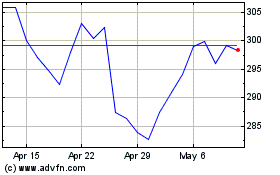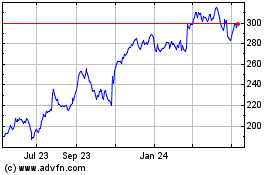Hyatt Hotels Opens Up 8% After Pricing In Range
November 05 2009 - 11:11AM
Dow Jones News
Hyatt Hotels Corp.'s (H) IPO proved Thursday what every hotel
operator knows: if priced right, even flawed space can be
filled.
Despite its presence in an industry that's full of vacancy
signs, the company's initial public offering enticed investors to
buy, with the stock pricing within its expected range and trading
higher at the open.
The deal's early performance provided welcome relief during a
rocky period in the new-issuance market. In the last seven days,
two IPOs that were expected to debut--energy company AEI and bank
PlainsCapital Corp.--were pulled due to market conditions, and
several offerings in recent weeks have priced poorly and traded
down on their first days.
Hyatt's stock opened at $27 a share on the New York Stock
Exchange, up 8% from its initial public offering price of $25. All
38 million shares in the offering were sold by the founder's
descendants, the Pritzker family, at a price within its expected
range of $23 to $26 a share. Goldman Sachs Group Inc. (GS) managed
the deal.
The hotel chain, the 10th-largest in the world based on number
of rooms, was plagued with investor uncertainty about its offering
in recent weeks, but analysts were in agreement that the company's
price range represented a bargain. Morningstar Inc. (MORN) analysts
valued the shares at $25, while IPOdesktop.com President Francis
Gaskins said the company priced its shares below the company's book
value.
Among the positives for Hyatt are its strong brand name and a
balance sheet that could be the envy of any business, with low debt
and a strong cash stockpile compared to its competitors. Optimists
could argue that if investors want to buy a hotel chain, Hyatt is
the one to own.
A strong balance sheet "gives them dry powder to strengthen
their position strategically. They can be acquirers at time when
there are not a lot of buyers out there," said Todd Jordan, a
managing director and analyst at Research Edge LLC in New Haven,
Conn.
Hyatt's successful debut comes at a time when the entire lodging
industry is in the midst of a slump due to last year's economic
downturn. Hyatt hasn't been spared: In the first three quarters of
the year, it posted a loss. The company says 2009 marked some of
the most significant declines in revenue per available room
experienced in recent history, being steeper and having a greater
negative impact on its bottom line than at any other time in at
least two decades.
Because hotels carry a high fixed-cost base, investors must hang
their hopes on the economy pulling companies like Hyatt back out of
the slump.
Hyatt's debut comes during a period of uncertainty in the IPO
market itself. Broader stock indices have been volatile in recent
weeks, and investors have been demanding price discounts on new
offerings. In the latter half of October, a number of deals
performed poorly on their first days of trading.
Hyatt didn't receive any money from the offering, since all the
shares were sold by the Pritzker family, whose internal
disagreements are so intense that the IPO prospectus contained a
warning that they could disrupt its business. The Pritzkers will
retain voting control over Hyatt, thanks to a dual-class share
structure that gives the family 10 votes per share
Hyatt, which was originally set to trade Friday, moved the deal
up by one day. It is the first of two IPOs that were expected to
begin trading Thursday; the other is genealogy Web site
Ancestry.com Inc., which is set to trade on the Nasdaq under the
symbol ACOM.
-By Lynn Cowan, Dow Jones Newswires; 301-270-0323;
lynn.cowan@dowjones.com
Morningstar (NASDAQ:MORN)
Historical Stock Chart
From Jun 2024 to Jul 2024

Morningstar (NASDAQ:MORN)
Historical Stock Chart
From Jul 2023 to Jul 2024
